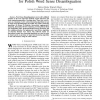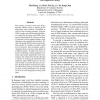35 search results - page 4 / 7 » Transfer Learning, Feature Selection and Word Sense Disambig... |
IMCSIT
2010
13 years 4 months ago
2010
Word Sense Disambiguation in text is still a difficult problem as the best supervised methods require laborious and costly manual preparation of training data. Thus, this work focu...
CIARP
2004
Springer
14 years 23 days ago
2004
Springer
We present a method for extracting selectional preferences of verbs from unannotated text. These selectional preferences are linked to an ontology (e.g. the hypernym relations foun...
TAL
2004
Springer
14 years 21 days ago
2004
Springer
This paper presents an algorithm to apply the smoothing techniques described in [1] to three different Machine Learning (ML) methods for Word Sense Disambiguation (WSD). The method...
EMNLP
2008
13 years 8 months ago
2008
The accuracy of current word sense disambiguation (WSD) systems is affected by the fine-grained sense inventory of WordNet as well as a lack of training examples. Using the WSD ex...
BMCBI
2010
13 years 7 months ago
2010
Background: Word sense disambiguation (WSD) algorithms attempt to select the proper sense of ambiguous terms in text. Resources like the UMLS provide a reference thesaurus to be u...


